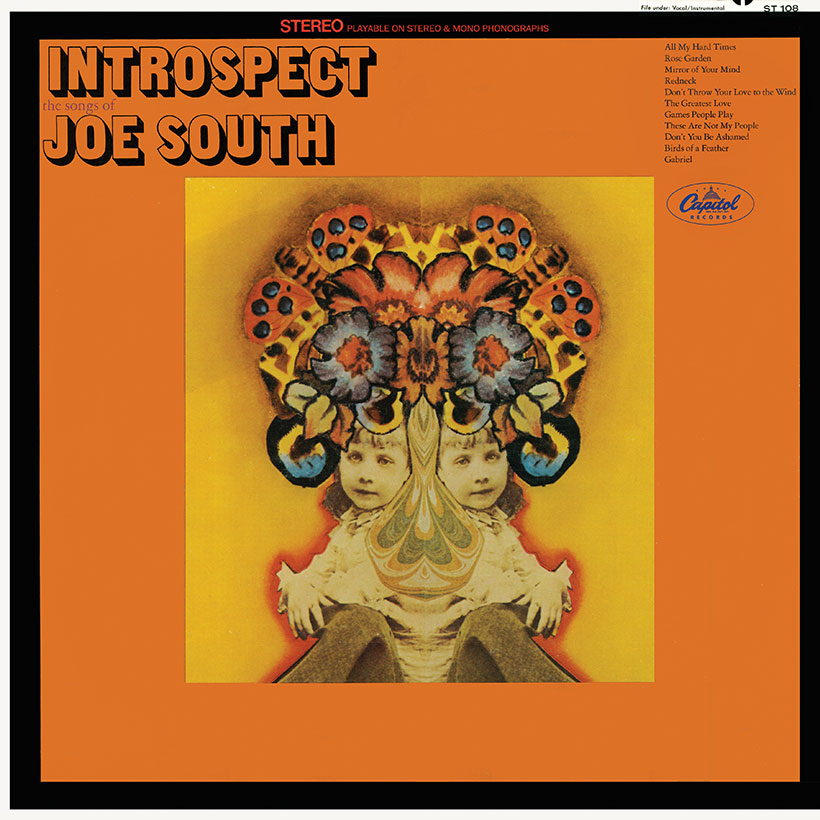Joe South’s Introspect, took time to take off – but when it did, it set the music world buzzing.
In 1968, Atlanta-born guitarist and songwriter South signed to Capitol Records. The move was brokered by producer Bill Lowery who thought the record company that was already the home of such progressive pop-country talent as Glen Campbell and Bobbie Gentry would be right for this rising star. South was given extraordinary latitude for his first album: he produced the record, sang, played guitar, and composed a series of songs in a process he described as “crawling into my own head.”
Listen to Instrospect on Apple Music and Spotify.
South, who was born Joseph Alfred Souter, was not an unknown when he was signed by Capitol. His remarkable pedigree went back to the 50s, when he had a novelty hit with a quirky song called “The Purple People Eater Meets The Witch Doctor.” His songwriting ambitions grew and, by 1962, he penned “Untie Me,” which became a hit for soul group The Tams. He also wrote “Hush,” a success for both Billy Joe Royal and Deep Purple. Among his other work was “Down In The Boondocks,” which was a favorite of Ry Cooder’s. Mike McCarty, who designed album covers for South, recalled that John Lennon said he thought South was “one of the greatest songwriters in the world.”
South was also a sought-after session musician in the 60s in Atlanta, Muscle Shoals, and Nashville. Among his notable work was playing bass guitar on much of Bob Dylan’s Blonde On Blonde album in 1966, followed by creating the powerful tremolo guitar licks that ran through Aretha Franklin’s soul classic “Chain Of Fools.”
South’s affecting baritone voice (ably supported by his backing singers, The Believers), excellent guitar playing, and highly inventive production skills all found full expression on his own project. Released on November 1, 1968, Introspect sounded fresh and interesting but it failed to make an initial impact and Capitol slowed promotion on the album. What changed everything was one brilliant single that attracted a cover version. When country music singer Freddy Weller had a hit with the song “Games People Play,” which opened Side Two of the album, Capitol realized they had a winner on their hands with South, and re-released Introspect followed by a second hybrid album, called Games People Play, which was brought out quickly in 1969.
This time “Games People Play” reached No. 12 on the Billboard singles charts and won South Grammys for Best Contemporary Song and Song Of The Year in 1970. The song, inspired by the eponymous bestseller about the psychology of human relationships by Dr. Eric Berne, and featuring some iconic sitar playing, is a forceful attack on intolerance, hypocrisy, and inhumanity, and includes the lines:
People walking up to you
Singing “Glory hallelujah”
And they’re tryin’ to sock it to you
In the name of the Lord
It was not the only stunning song on Introspect. The world-weary “Rose Garden” (“I beg your pardon, I never promised you a rose garden”) was a haunting song which, three years later, provided a worldwide hit for country singer Lynn Anderson, reaching No. 3 in the charts and becoming her signature tune.
“All My Hard Times” was an updated take on the traditional spiritual “All My Trials,” while “Redneck” satirized the bigot who picks on hippies, Jews, and black people. “These Are Not My People” is a song of alienation, while “Gabriel” is a parable. Other strong tracks include “Don’t Throw Your Love To The Wind” and “Birds Of A Feather,” and the love song “Don’t You Be Ashamed,” with its iconic 60s lyrics such as, “Girl, don’t let the world get you uptight.”
South possessed the talent to be a global star but he didn’t like to tour, and said of his double Grammy triumph: “The Grammy is a little like a crown. After you win it, you feel like you have to defend it. In a sense, I froze. I found it hard to go back into the studio because I was afraid the next song wouldn’t be perfect.”
He continued to write some fine songs – “Walk A Mile In My Shoes” was a hit for Elvis Presley, Bryan Ferry, and Coldcut – but everything went into meltdown in the years after Introspect, sparked in part by the suicide of his brother, in 1971. Tommy South had played drums on the album and his wife, Barbara, had played keyboards. Joe South became a recluse for some years in Maui and, to help cope with his grief, sought sanctuary in drug use.
Though he returned to making music in the years before his death from a heart attack, in 2012, Joe South’s musical triumphs lay in the past. However, triumphs they were, and Introspect, with its array of splendid songs, remains a late 60s gem.



